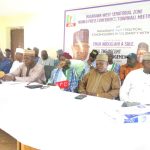Socio-Economic Rights and Accountability Project (SERAP) has frowned against the reintroduction of Social Media Regulation Bill and urged the Senate President, Godswill Akpabio and Speaker of House of Representatives, Tajudeen Abbas to kill it.
Recall that the National Broadcasting Commission (NBC) had last week stated that, “one of Nigeria’s major problems is social media, and described the social media as “a monster”.
SERAP urged the leadership of the National Assembly to lobby President Bola Tinubu to drop any ongoing efforts to restrict the activities of Nigerians using Google, YouTube, TikTok and other Micro blogging platforms.
In the letter dated 14 October 2023 and signed by its Deputy Director Kolawole Oluwadare, SERAP said that social media is neither Nigeria’s problem nor a monster. It added that any regulation of it would have arbitrary and excessive effects, and cause incalculable damage, both in material and human rights terms.
Rather than rushing to pass the social media regulation bill, SERAP advised the National Assembly to encourage the Federal Government to maximize opportunities around social media access, and address the growing social and economic inequalities in the country.
SERAP explained that the reintroduced bill would criminalize the legitimate and lawful exercise of human rights.
SERAP said that any move to regulate social media would be inconsistent and incompatible with the provisions of the Nigerian Constitution 1999 [as amended] and the country’s international human rights obligations.
According to SERAP, the proposed bill raises serious concerns about the rights to freedom of expression and privacy, and would lead to digital siege.
SERAP said that it shall take all appropriate legal actions against the National Assembly and the Federal Government if the social media regulation bill is ever passed into law.
The letter stated, “We urge you to request the administration of President Bola Tinubu to publish the details of any ongoing discussion and engagement with Google, YouTube, TikTok and other social media companies.
“The reintroduction of the social media regulation bill would lead to deterioration of the human rights situation in the country and carry major economic costs for all sectors, as well as exacerbate social and economic inequalities.
“It would effectively deepen digital divides in the country and seriously undermine the Tinubu administration’s expressed commitment to develop this sector.
“Under international law, all restrictions on the operation of social media companies and other intermediaries must comply with the requirements of legality, legitimacy and necessity.
“The regulation of social media may be incompatible with the services of major social media and private messaging intermediaries, negatively impacting the free flow of information and ideas, and affecting economic and social activities.”
The organisation asked The National Assembly to put pressure on the Federal Government to comply with the requirements of the Nigerian Constitution 1999 and the country’s international human rights obligations regarding the rights to freedom of expression, privacy and participation.”
“Access to social media is widely recognized as an indispensable enabler of a broad range of human rights. It is central to freedom of expression and the realization of many other human rights including education, freedom of association and assembly, access to information, and participation.
“The Federal Government has the legal obligations to promote and facilitate the enjoyment of human rights, and to take all steps necessary to ensure that all individuals have meaningful access to social media. The authorities should refrain from unduly interfering with access to digital communications platforms.
“The Nigerian Constitution and these human rights treaties protect everyone’s right to freedom of expression, which includes the freedom to seek, receive and impart information of all kinds, regardless of frontiers. States have the obligation to respect and ensure the right to freedom of expression, without distinction of any kind.
“The Nigerian Constitution and human rights treaties protect a broad range of expression, including political discourse, commentary on one’s own and public affairs, canvassing, discussion of human rights, journalism, and artistic expression.
“This includes information that may be regarded as offensive, false or untrue by some people but is considered legitimate political discourse by others. Restrictions on the right to freedom of expression are only permissible when they meet the requirements of legality, necessity, proportionality and non-discrimination.
“The onus to show that restrictions comply with those requirements is on the State seeking to restrict rights. Social media regulation bills generally do not meet those requirements”.
Director-General of the National Broadcasting Commission (NBC), Balarabe Ilelah, recently stated that the social media regulation bill has been sent to the National Assembly. The bill is reportedly seeking to repeal and reenact the NBC Act, CAP L11 laws of the Federation of Nigeria 2004.
“We have already submitted a bill to amend the NBC act. One of our major problems now is social media. Unless there is a law that allows NBC to act on social media issues, the issue will continue to be a monster in our daily lives in this country”, NBC stated.
Similarly, Mrs. Francisca Aiyetan, Director, Broadcast Monitoring of the NBC, recently said that without regulation, young people could be misguided. According to the NBC, the Federal Government is currently engaging with Google or YouTube, TikTok, ‘so we know the faces behind these [social media] platforms.
SERAP said that if the 2023 social media regulation bill which has reportedly passed the first reading is the same as the 2019 bill, it would impose disproportionate penalties on Nigerians solely for exercising their human rights.
Techrectory with Agency Report.




